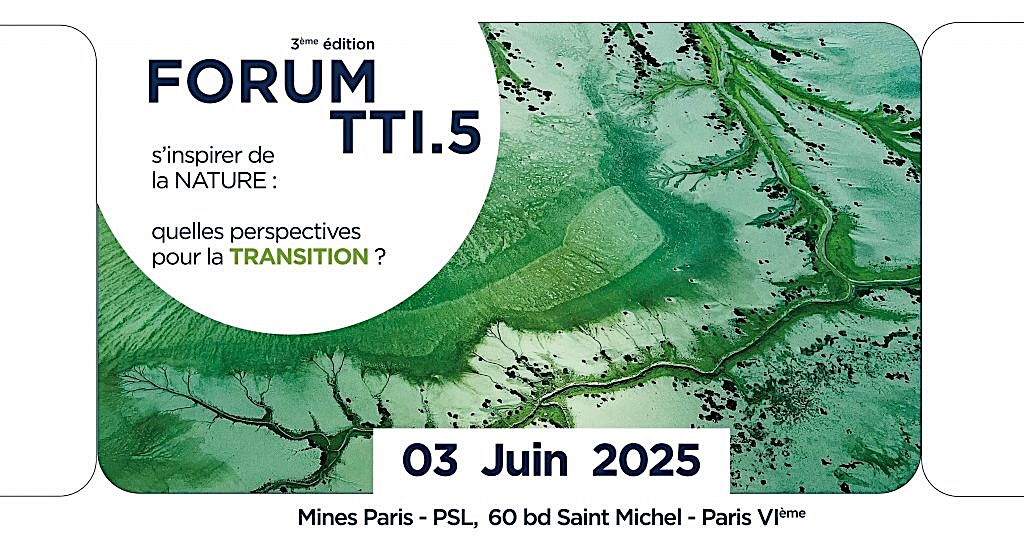
TTI.5 Award for the best case study of an environmental controversy
from the course ‘Description of controversies’
June 3, 2025, 6 -7 pm
Mines Paris – PSL, 60 Bd Saint-Michel, 75006 Paris
Amphithéâtre Henri Poincaré
TTI.5 The Transition Institute 1.5 is organizing its third annual forum, entitled “Taking Inspiration from Nature: What Perspectives for Transition?”
Registration for the 3rd TTI.5 Forum is required. Please use this link.
Download the full program.
For its 3rd edition, and as part of the course entitled “Description de controverses” [Description of controversies] coordinated by Madeleine Akrich (CSI-i3 – Mines Paris-PSL), who will introduce this session, the TTI.5 Environmental Controversy Award will reward the best project for the study of an environmental controversy carried out by students in the Civil Engineering Program at Mines Paris-PSL.
The case studies nominated for the award were selected based on the highest marks received for the papers and oral presentations. The authors of the three nominated projects will each give a 10-minute presentation on their work. A vote by the public will follow immediately after the presentations. The award will be presented to the winners by Matthieu Mazière, Director of Studies at Mines Paris – PSL.
The environmental controversy case studies that have been nominated and will be submitted to the vote of the public are:

Le recyclage du plastique peut-il tenir ses promesses ?
[Can plastic recycling live up to its promise?]
The group’s work will be presented by Grégoire Leboucher, Fanny Picamal and Alizée Cinquin.
The development of the plastics industry in the 20th century is widely criticized today. The damaging effects of plastic on health and the environment are at issue. Although recycling is presented as a solution to plastic waste, only a fraction is actually recycled; the rest often ends up in landfills or oceans. The very characteristics that make plastic attractive — its stability and durability — also make it difficult to recycle. The process is often complex and costly and can generate greenhouse gases and other pollutants. Controversial issues include the promise of plastics and recycling technologies, and the development of alternative materials such as bio-plastics. Read the article
L’agrivoltaïsme – Photovoltaïque en terre agricole : énergie d’avenir ou menace pour l’agriculture ?
[Agrivoltaics – Photovoltaics on farmland: energy for the future or a threat to agriculture?]
The group’s work will be presented by Alice Machelon, Astrid Soulas, Marion Stenta and Théo Takla.
Agrivoltaic technologies are currently experiencing strong growth. Introduced twenty years ago, these technologies combine agricultural production and photovoltaic electricity generation on the same site. While they offer the potential to increase the area available for renewable energy production, they also raise a number of questions. Which crops are compatible with these infrastructures? Will this lead to a de facto reduction in arable land? Economic questions also arise. What is the profitability of these installations? What consequences might the entry of energy companies into this sector have on farmland prices? Ultimately, will agrivoltaics enable the combination of energy and agricultural production? Read the article
Cohabiter avec les rats – Une relation ambivalente ?
[Cohabiting with rats – An ambivalent relationship?]
The group’s work will be presented by Augustin Le Corre, Piero Jaime Hinostroza, and Lilia Ben Mariem.
Garbage collectors on strike, large-scale works underway in the run-up to the Olympic Games… and the presence of rats in cities is back in the spotlight. Some consider them pests to be eradicated, while others consider them contributors to biodiversity. Either way, rats have become a subject of public debate, mobilizing elected representatives, citizens, doctors, and ecologists. Their numbers, the diseases and nuisances they cause, the methods used to control their proliferation, their usefulness – everything is a subject of controversy, and everyone wonders whether we should cohabit with rats. Read the article
Photo credit: #1: Image générée par Intelligence Artificielle (Mistral, Le Chat). #2: Jenson, 2019. iStock. #3 : Image extraite de Ratatouille , film réalisé en 2007 par Brad Bird.

